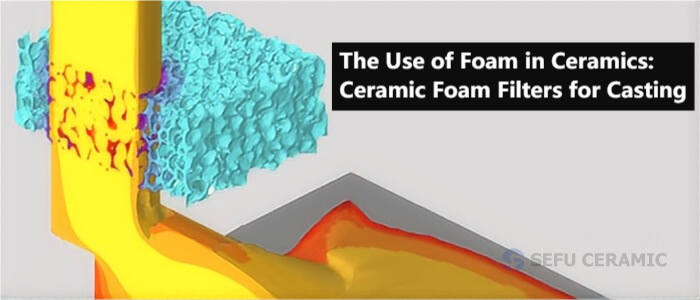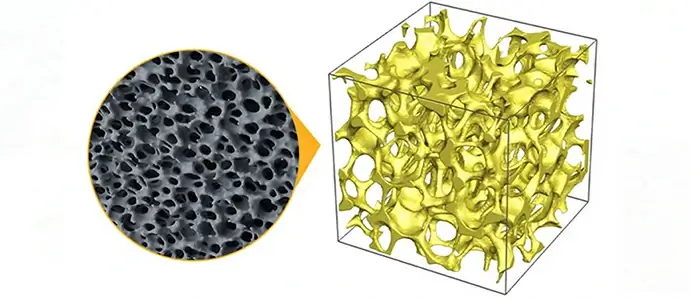Introduction:
Foam, an integral component in ceramics, plays a crucial role in shaping the properties and functionalities of ceramic materials. From enhancing insulation to facilitating filtration, foam adds versatility to ceramic products, contributing to their widespread applications across various industries.
Casting foundries stand as the backbone of various industries, facilitating the creation of intricate metal components through the art of casting. Amidst the myriad of techniques and materials employed in this process, the incorporation of foam within ceramics emerges as a vital component, revolutionizing the efficiency and quality of cast products.
The Use of Foam in Ceramics: Ceramic Foam Filters for Casting
SEFU Ceramic foam filters play a critical role in various industrial processes, particularly in metal casting and wastewater treatment. Foam ceramics with tailored pore structures enable efficient filtration and separation of impurities from molten metals or liquids. The interconnected network of pores in ceramic foam filters facilitates the passage of fluids while trapping contaminants, thereby improving the quality and purity of the final product. Industries rely on ceramic foam filters to achieve precise filtration, ensuring the integrity and performance of manufactured goods.

At the heart of this discussion lies the ceramic foam filter, a remarkable innovation that has transformed the landscape of casting foundries. These filters, composed of porous ceramics such as Silicon Carbide, Alumina, and Zirconia, serve as indispensable tools in the purification of molten metals. The intricate network of interconnected pores within the porous ceramic filter enables the filtration of impurities, ensuring the production of high-quality castings with enhanced mechanical properties.
Refractory materials play a fundamental role in casting foundries, with porous ceramics emerging as a cornerstone in this domain. Ceramic foam filter is a kind of refractory material. The utilization of Silicon Carbide, Alumina, and Zirconia in ceramic foam filters highlights their exceptional resistance to high temperatures, making them ideal candidates for the rigorous conditions encountered during casting processes. The ability of these porous ceramics to withstand extreme thermal and chemical environments ensures the longevity and reliability of casting foundry operations.
SEFU ceramic foam filters exemplify the pinnacle of innovation in the realm of porous ceramic technology. Developed with meticulous precision and engineering prowess, these filters embody the synergy between advanced materials science and practical application. The incorporation of SEFU ceramic foam filters in casting foundries elevates the efficiency and effectiveness of metal casting processes, yielding superior castings with minimal defects. In addition, SEFU ceramic foam filter has also been extended in other fields, such as water purification, air purification, and other fields.
The significance of foam in ceramics extends beyond its role in filtration; it also encompasses the realm of mold-making within casting foundries. Porous ceramic materials, with their inherent porosity and thermal stability, serve as ideal substrates for creating intricate molds for casting operations. The ability to precisely control the porosity and permeability of these ceramic foams enables the production of molds tailored to the specific requirements of each casting application.

Furthermore, the versatility of foam in ceramics enables the fabrication of complex shapes and structures, facilitating the realization of intricate casting designs. Whether it be the replication of fine details or the creation of hollow components, porous ceramic materials offer unparalleled freedom in mold design, allowing casting foundries to push the boundaries of creativity and innovation.
Conclusion:
Foam plays a multifaceted role in ceramics, enhancing their thermal, mechanical, and acoustic properties while enabling innovative applications across diverse industries. From insulation and filtration to structural reinforcement and biomedical engineering, foam ceramics continue to drive advancements in material science and manufacturing. As research and technology progress, the utilization of foam in ceramics is poised to expand further, opening new avenues for functionality, sustainability, and performance optimization.
The use of foam in ceramics within casting foundries represents a convergence of advanced materials science and manufacturing ingenuity. From the purification of molten metals to the creation of intricate molds, porous ceramic filters, and materials play a pivotal role in enhancing the efficiency, quality, and versatility of casting processes. As casting foundries continue to push the boundaries of what is possible, the integration of foam in ceramics will undoubtedly remain a cornerstone of innovation in the pursuit of excellence.

